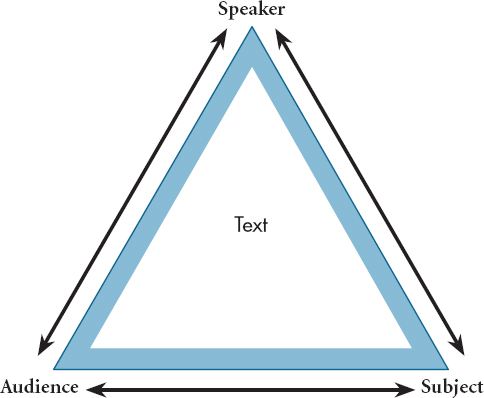The Rhetorical Triangle
Printed Pages 3-4Another important aspect of the rhetorical situation is the relationship among the speaker, audience, and subject. One way to conceptualize the relationship among these elements is through the rhetorical triangle. Some refer to it as the Aristotelian triangle because Aristotle used a triangle to illustrate how these three elements are interrelated. How a speaker perceives the relationships among these elements will go a long way toward determining what he or she says and how he or she says it. Let’s use the rhetorical triangle to analyze Gehrig’s speech.
The speaker is the person or group who creates a text. This might be a politician who delivers a speech, a commentator who writes an article, an artist who draws a political cartoon, or even a company that commissions an advertisement. Don’t think of the speaker solely as a name, but consider a description of who the speaker is in the context of the text. The speaker of the speech we just read is not just Lou Gehrig but baseball hero and ALS sufferer Lou Gehrig. Sometimes, there is a slight difference between who the speaker is in real life and the role the speaker plays when delivering the speech. This is called a persona. Persona comes from the Greek word for “mask”; it means the face or character that a speaker shows to his or her audience. Lou Gehrig is a famous baseball hero, but in his speech he presents himself as a common man who is modest and thankful for the opportunities he’s had.

The audience is the listener, viewer, or reader of a text or performance, but it is important to note that there may be multiple audiences. When making rhetorical decisions, speakers ask what values their audiences hold, particularly whether the audience is hostile, friendly, or neutral, and how informed it is on the topic at hand. Sure, Gehrig’s audience was his teammates and the fans in the stadium that day, but it was also the teams he played against, the fans listening on the radio, and posterity—us.
The subject is the topic. And the subject should not be confused with the purpose, which is the goal the speaker wants to achieve. Gehrig’s subject is his illness, but it is also a catalog of all the lucky breaks that preceded his diagnosis.